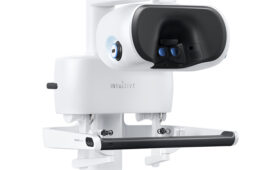 Medical device manufacturer V6CO today said it is sending nearly $3 million worth of medical supplies to Ukraine as Russia’s invasion stretches beyond six months.
Medical device manufacturer V6CO today said it is sending nearly $3 million worth of medical supplies to Ukraine as Russia’s invasion stretches beyond six months.
New York City-based V6CO’s donation includes more than 11.5 million syringe sets in support of aid efforts.
“At V6CO we offer our support for the people who have been impacted by the invasion of Ukraine,” V6CO CEO Mance Zhu said in a news release. “As individuals and organizations, we can all do our part to collectively provide support and work to make a difference.”
Medical supplies remain in high demand in Ukraine as fighting continues and supply chains struggle to keep up, according to United Help Ukraine, the nonprofit charitable organization partnering with V6CO.
RELATED: Autotranfusion device maker ships units to Ukraine
“We remain grateful for the outpouring of support from dedicated groups across the globe in our fight to maintain our independence,” said Kostyantyn Vorona, counsellor and head of the consular division at the Ukrainian Embassy in the U.S.
V6CO makes breast pumps, ultrasound gel, hearing aids and a variety of other medical devices sold through Costco and CVS Health. The device maker joins a growing list of medical device companies supporting Ukraine relief efforts with donations and fundraisers or by suspending operations in Russia.
UPDATED: How medtech and pharma are responding to Russia’s invasion of Ukraine
The U.N. Office of the High Commissioner for Human Rights (OHCHR) last week reported 13,477 civilian casualties — 5,587 killed and 7,890 injured — in the country since Russia launched its invasion in February. The death toll includes nearly 400 children.
“Most of the civilian casualties recorded were caused by the use of explosive weapons with wide area effects, including shelling from heavy artillery, multiple launch rocket systems, missiles and air strikes,” OHCHR said. “OHCHR believes that the actual figures are considerably higher, as the receipt of information from some locations where intense hostilities have been going on has been delayed and many reports are still pending corroboration.”


![A photo of the Medtronic GI Genius ColonPro polyp detection system flagging a potential sign of colon cancer during a colonoscopy. [Photo courtesy of Medtronic]](https://www.medicaldesignandoutsourcing.com/wp-content/uploads/2024/04/Medtronic-GI-Genius-doctors-268x170.jpg)

